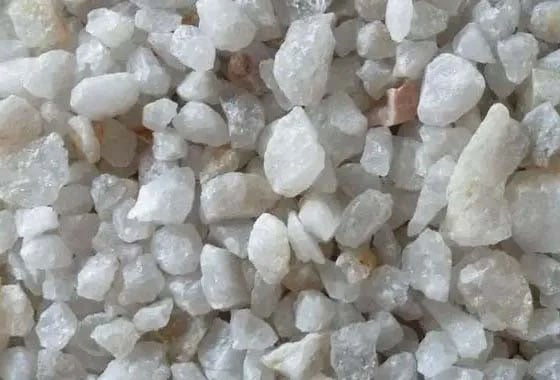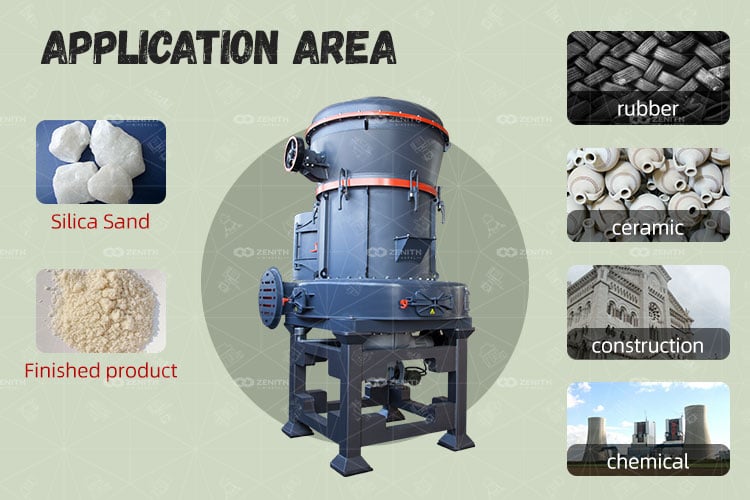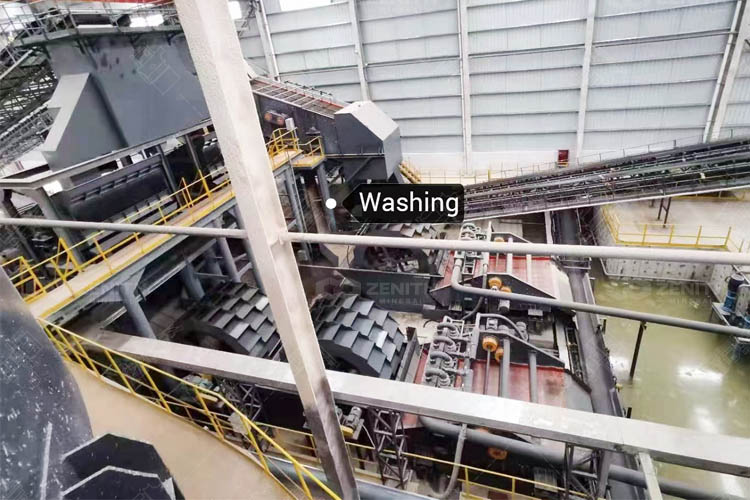Silica sand, also known as silica or quartz sand, is a refractory particle with quartz as the main mineral component and a particle size of 0.020mm-3.350mm. According to the different mining and processing methods, it is divided into artificial silica sand and natural silica sand such as washed sand, scrub sand, and selected (flotation) sand.
Washed sand is mainly used in the foundry industry, scrubbed sand is mainly used in the production of architectural grade glass and glass containers, and flotation sand is the raw material for the production of float glass.
Common specifications of silica sand are: 1-2mm, 2-4mm, 4-8mm, 8-16mm, 16-32mm, 10-20 mesh, 20-40 mesh, 40-80 mesh, 100-120 mesh, 200 mesh, 325 mesh.

There are five main processes including Feeding, Crushing, Sand making, Screening and Washing for silica sand processing plant.
Feeding:
The raw material is conveyed to the primary crushing equipment through the feeder,it's usually a jaw crusher.
Crushing:
The mined silica sand (quartz sand) ore is continuously fed into the coarse jaw crusher by the vibrating feeder for primary crushing, and then the particles after primary crushing are sent to the fine jaw crusher by the belt conveyor for re-crushing, and the crushed silica sand particles are sent to the vibrating screen for screening and grading.
Sand making:
After the screening process, the quartz sand particles that meet the feeding particle size requirements of the vertical shaft impact crusher enter the sand making machine for sand making process, and those that do not meet the requirements are returned to the crusher for re-crushing.

Screening:
The qualified silica sand particles from the sand making machine are returned to the circular vibrating screen for re-screening, the materials that meet the requirements go to the next process, and the materials that do not meet the requirements are returned to the sand making machine for sand making and crushing again;
Sand washing:
The produced silica sand is sent to the sand washing machine by the belt conveyor for cleaning, and the cleaned silica sand is sent to the finished product pile.
1. Reasonable equipment configuration, advanced manufacturing technology, reliable quality, wear-resistant wearing parts and long service life.
2 The failure rate, total energy consumption and power consumption during operation are relatively low, and the operating cost can be reduced by more than 50%.
3 Equipped with a pulse dust collector, there will be no dust pollution problem during operation, and the low-carbon environmental protection effect is more significant.
4 The price of the whole production line is very economical and the after-sale service is more perfect. It is a production line with high application value in the market.
Silica sand is produced by a series of crushing and sand-making treatment of large pieces of quartz stone into finished sand of various specifications. The silica sand production line equipment recommends jaw crusher, cone crusher, vertical shaft impact crusher (sand making machine) and wheel bucket sand washing machine etc.
1. Coarse crushing machine:
The texture of quartz stone is very hard, and the efficiency of sand making directly is not high, and the damage to the sand making equipment is relatively large, so we need jaw crusher as coarse crushing equipment. The primary crushing of the jaw crusher can make all kinds of block-shaped quartz stone uniform in particle size, which can meet the requirements of the feed opening of the sand making machine, with large output, large crushing ratio, uniform product particle size, and low equipment price and low investment cost.
2. Medium crushing machine:
The cone crusher is adopted, it has new crusher structure and optimized laminated crushing cavity, which makes the production capacity large and the crushing efficiency high. In addition, it also has the characteristics of automation and intelligence, high production safety and good environmental performance. It is suitable for hard materials and high output requirements.
3. Fine crushing machine:
Adopt sand making machine as the fine crushing equipment. The feeding size is below 50mm, and the output size can reach 0-5mm. It is more suitable for shaping and sand making of silica sand. It has a variety of cavity types. Higher efficiency, energy saving and environmental protection, and the finished product has a uniform particle size, the particle size is about 30 mesh, and the needle flake content is low.
If silica sand is to be used as a substitute for river sand, its own hardness and toughness need to be improved. The finished silica sand processed by the silica sand processing plant has more stable performance, no cracks and fine lines, and the mud content is effectively controlled. The plasticity index In line with national regulations, the finished product has no segregation of coarse and fine particles.
From the perspective of development process, silica sand is widely used in glass, casting, ceramics and refractory materials, metallurgy, construction, chemical industry, plastics, rubber, abrasives and other industries.



Depending on the content, purity and chemical composition of the glass, silica sand can be used to make different types of glass, as well as glass instruments and daily utensils made of glass, such as glasses, spectacles, microwave oven turntables, mobile phone screens, etc.
The whiteness of ceramics has an important influence on its quality. In order to improve its whiteness, adding some silica sand to the ceramic raw materials can also reduce the drying time of the ceramic body and avoid cracks caused by too slow drying. At the same time, after adding silica sand, the peeling phenomenon of the ceramic surface will disappear, so the addition of silica sand improves the quality of ceramics to a great extent.
In terms of physics, silica sand has the characteristics of thermal shock resistance and high hardness, and has special properties, so it has a great application in the casting of mold cores and molds. Casting has higher requirements on the physical properties of silica sand, such as the particle size and shape of silica sand.
Because silica sand has good piezoelectric effect, high insulation, corrosion resistance, high temperature resistance and other properties, which are not found in other materials, it has very important applications in aviation and aerospace.
Silica sand is most commonly used in construction. For example, when building houses and roads, adding a certain proportion of sand to cement and concrete can make walls and roads stronger and prevent cracks from appearing.
In addition, there are some other special applications, such as sandpaper, gauze and other abrasive materials; adding silica sand to plastics can improve the wear resistance of plastics.

we will delve into the intriguing world of silica sand, uncovering its origins, uncovering its diverse applications, and examining the innovative ways in which this shimmering treasure is shaping the future of our built environment.

To get silica sand, we need crushing and grinding process if the raw material is large and in silica sand production plant, silica sand grinding machine is the key equipment.

If you want to know about the profit, you must first understand the cost composition in the silica sand washing plant.
Fill your requirements here, and we'll send the custmized solution and quotation to you by the reserved contact information.